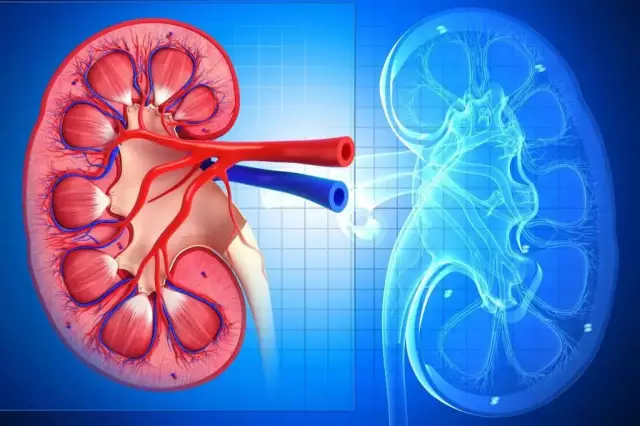- Author Rachel Wainwright [email protected].
- Public 2023-12-15 07:39.
- Last modified 2025-11-02 20:14.
Chronic nephritis
Chronic nephritis is a disease that develops as a result of untreated acute nephritis.

The disease develops, as a rule, as a result of prolonged exposure to the kidneys of infectious foci. Sometimes chronic nephritis can develop without an acute stage of nephritis in the past. First of all, the chronic nature of the disease depends on the presence of infections in the body, inadequate treatment of acute nephritis in the past and unfavorable environmental conditions.
In chronic nephritis, anatomical changes occur in the kidneys, leading to the formation of cellular exudate in capsules (the so-called crescent moon), widespread damage to the renal vessels, degenerative changes in the tubular epithelium. All of these changes over time lead to desolation of individual glomeruli and wrinkling of the kidney as a result of atrophy of some areas of the renal parenchyma.
The course of chronic nephritis
During chronic nephritis, the following stages should be distinguished:
- Stage of renal compensation, the adequacy of the nitrogen-excreting renal function. As a rule, this stage is accompanied by such symptoms of chronic nephritis as edema, hematuria, albuminuria, and increased blood pressure. Sometimes these symptoms are mild, only albuminuria occurs.
- Stage of renal decompensation, insufficiency of renal nitrogen excretory function. At this stage, the amount of protein in the urine may fall, the edema may also decrease, but hypertension, on the contrary, becomes more stable. The main symptoms of chronic nephritis at this stage are the initial failure of the kidneys and the buildup of slag nitrogen in the blood. This stage is characterized by azotemic uremia.
As a rule, the outcome of chronic nephritis is fatal. The duration of the course of the disease is different and can range from 1-20 years or more. Death can also occur from cerebral hemorrhage, heart failure, secondary infections, etc.
Types of chronic nephritis
- Subacute extracapillary nephritis. This form is characterized by the formation of cellular exudate in the cavity of the capsules. About six months after the onset of the disease, persistent hypertension and persistent hematuria appear. Often one can observe such symptoms of chronic nephritis as persistent edema, the presence of azotemia, increasing anemia, a high concentration of creatinine and aromatic compounds in the blood, as well as uremic symptoms, which ultimately lead to the patient dying by the end of the first two years of the disease.
- Nephrotic chronic nephritis. This type is characterized by such symptoms of chronic nephritis as persistent edema, significant albuminuria and normal blood pressure. Anatomically, this species is characterized by intracapillary nephritis with nephrotic changes in the tubules. The swelling is not accompanied by cyanosis and shortness of breath, is aggravated by the ingestion of salty food and can persist for a long time (from several months to several years). If patients during a long edematous period do not die from infections, then a non-edematous period begins, characterized by a general improvement in the patient's condition. However, this phenomenon is temporary, and later death occurs from chronic true uremia.
- Mixed chronic nephritis. This type of nephritis is characterized by persistent edema of the lipoid-nephrotic type, increased blood pressure and cardiovascular symptoms. Subsequently, renal failure joins these signs. Typically, patients die as a result of severe chronic uremia. This form of chronic nephritis is also characterized by death from cerebral hemorrhage, heart failure, and infections.
- Chronic hypertensive nephritis. This type of disease can be almost asymptomatic for a long period of time. A characteristic symptom is only hypertensive symptoms that usually occur with hypertension (vascular spasms, paresthesias, cramps of the calf muscles, etc.). Anatomically, intracapillary nephritis can be observed with clear signs of small artery sclerosis. This disease is usually discovered quite by accident during the examination. Chronic nephritis of this type can last for many years, after which the patient develops a picture of chronic true uremia.
Prevention of chronic nephritis
Prevention of chronic nephritis primarily consists in the prevention of acute nephritis, its early diagnosis, timely and adequate treatment.

The course of chronic nephritis can be alleviated by a rational regimen and treatment of focal infection, thereby delaying the onset of the stage of renal failure that does not respond to treatment.
Chronic nephritis treatment
For a long time, in chronic renal diseases, patients have been recommended a certain hygiene regime: wearing woolen underwear, strengthening non-irritating food, living in a warm and dry climate. When treating chronic nephritis, patients should avoid hypothermia, strenuous exercise, stressful situations, drugs that irritate the kidneys, and excessive food intake. All these measures are aimed not only at creating optimal conditions for the work of the damaged organ, but also for facilitating the activity of the whole organism as a whole.
In case of an inflammatory exacerbation of the disease, the occurrence of severe edema, weakening of the heart muscle and the manifestation of uremic symptoms, patients need bed rest.
In the treatment of chronic nephritis of the nephrotic type, a salt-free diet rich in proteins, thyroidin, and merkusal is prescribed. In case of complications by streptococci and pneumococci, penicillin and sulfonamide drugs are prescribed. The patient is shown staying in a warm and dry climate and taking cardiac and vasodilating drugs.
If a focus of infection is found, the patient is prescribed treatment for chronic nephritis with sulfonamide drugs and penicillin, physiotherapy methods. If the kidney function is satisfactory, the patient may be advised to undergo surgery. Removal of the infectious focus has the goal of stopping the toxic-infectious effect on the body, as well as eliminating the effect of the source of neuroreflex irritation.
In the treatment of chronic nephritis, the patient is prescribed a glucose solution under the skin and inside in large quantities in order to counteract uremic intoxication. If symptoms of uremic acidosis occur, the patient is prescribed alkalis and the use of alkaline-saline solutions.
Bloodletting has a beneficial effect on the manifestation of hypertensive and vascular symptoms. Against certain symptoms of uremia, drugs are used that affect the centers of the brain.
YouTube video related to the article:
The information is generalized and provided for informational purposes only. At the first sign of illness, see your doctor. Self-medication is hazardous to health!






